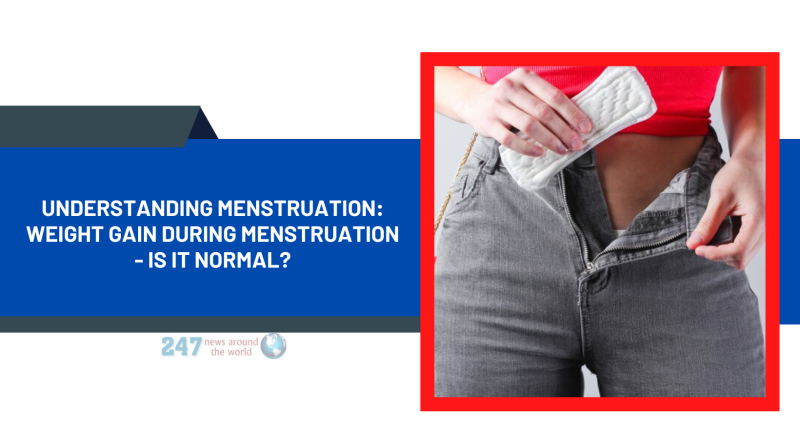We understand that weight gain during menstruation can be a common concern among women. At times, it may feel like you are gaining weight for no apparent reason, leaving you feeling frustrated and confused. In this article, we will discuss the reasons why women may experience weight gain during menstruation and what you can do about it.
Menstruation is a natural process that occurs in a woman’s body every month. It involves the shedding of the uterine lining, which occurs when an egg released during ovulation is not fertilized. Menstrual cycles can vary in length and can be influenced by a number of factors, including age, stress, and hormonal imbalances.

See Also | Movies That Will Inspire You to Stay Fit
Why Do Women Gain Weight During Menstruation?
Weight gain during menstruation can be caused by a number of factors, including water retention, hormonal fluctuations, and changes in diet and exercise habits.
Water Retention
Many women experience water retention during their menstrual cycle, which can cause bloating and weight gain. This is often due to fluctuations in estrogen and progesterone levels, which can cause the body to retain water. Additionally, sodium intake can contribute to water retention, so it is important to monitor your salt intake during this time.
Hormonal Fluctuations
Hormonal fluctuations during menstruation can also contribute to weight gain. In the days leading up to menstruation, estrogen levels drop, which can cause an increase in appetite and cravings for high-calorie foods. This can lead to overeating and subsequent weight gain.
Changes in Diet and Exercise Habits
Changes in diet and exercise habits during menstruation can also contribute to weight gain. Many women experience cravings for unhealthy foods during this time, which can lead to overeating and weight gain. Additionally, menstrual cramps and discomfort may cause women to be less active, which can also contribute to weight gain.
Also Read | How to Burn Belly Fat EXTREMELY Fast – 5 IMPORTANT TIPS
What Can You Do About Weight Gain During Menstruation?
While weight gain during menstruation can be frustrating, there are a number of things you can do to help manage your weight during this time.
Monitor Your Sodium Intake
As mentioned earlier, sodium intake can contribute to water retention, which can cause bloating and weight gain. During menstruation, it is important to monitor your sodium intake and limit your consumption of high-sodium foods.
Eat a Balanced Diet
Eating a balanced diet that is rich in fruits, vegetables, lean protein, and whole grains can help you manage your weight during menstruation. Additionally, eating smaller, more frequent meals throughout the day can help you avoid overeating.
Stay Active
While you may feel less motivated to exercise during menstruation, staying active can help you manage your weight and alleviate menstrual cramps and discomfort. Consider incorporating gentle exercises such as yoga or walking into your routine during this time.
Stay Hydrated
Drinking plenty of water can help alleviate water retention and reduce bloating. Aim to drink at least 8-10 glasses of water per day.
Also Read | 6 Mistakes You Should Never Make on the Mediterranean Diet
FAQs

A. Birth control pills may cause weight gain due to hormonal changes. However, they may also regulate hormonal fluctuations and help manage weight gain during menstruation.
A. No, weight gain during menstruation is temporary and should resolve after the period ends.
A. Mild weight gain of one to two pounds is normal during menstruation.
A. The first day of menstrual bleeding is considered Day 1 of the cycle. Your period can last anywhere from 3 to 8 days, but 5 days is average. Bleeding is usually heaviest in the first 2 days. Once the bleeding stops, the uterine lining (also called the endometrium) begins to prepare for the possibility of a pregnancy.
A. The four phases of the menstrual cycle are menstruation, the follicular phase, ovulation, and the luteal phase. Common menstrual problems include heavy or painful periods and premenstrual syndrome (PMS). Knowing when in the menstrual cycle a woman is most likely to conceive can increase the chance of pregnancy.
A. Periods last around 2 to 7 days, and women lose about 20 to 90ml (about 1 to 5 tablespoons) of blood in a period. Some women bleed more heavily than this, but help is available if heavy periods are a problem. Find out about heavy periods.
Conclusion
A common concern for women during their periods is weight gain. While mild weight gain may be normal, significant weight gain may indicate an underlying medical condition. Regular exercise, a balanced diet, and stress management can help you manage your weight during your menstrual cycle. It is recommended that you consult your doctor if you are concerned about your weight gain during menstruation so that any underlying medical issues can be ruled out.
Throughout your menstrual cycle, it is important to be patient and understand your body’s natural fluctuations. The key to managing weight gain during menstruation is to follow a healthy lifestyle and listen to your body’s needs. Do not stress over a little weight gain during your period, instead focus on your overall health and well-being.
You should not worry if you gain weight during your menstruation. It is normal, and there are ways to manage it. You can manage your weight and maintain good health during your menstrual cycle by following the tips outlined in this article and seeking medical advice when necessary. It is backed up by Science Backed Up research.
See Also: 10 Health Benefits of Cucumber And Carrot During Pregnancy
Continue to check our website for more articles of this kind. And, please use our comment section as well, we would love to hear from you.
Last Updated on February 23, 2023 by 247 News Around The World






